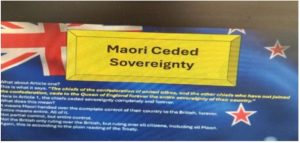Maori Did Not Have Sovereignty to Cede.
 This image is part of a video by Juian Batchelor, Stop Co-Governance dated the 17 February 2025 and states, “What about Article one? This is what it says”; “The chiefs of the confederation of the united tribes, and other chiefs who have not joined the confederation, cede to the Queen of England forever the entire sovreignty/sovereignty of their country”.
This image is part of a video by Juian Batchelor, Stop Co-Governance dated the 17 February 2025 and states, “What about Article one? This is what it says”; “The chiefs of the confederation of the united tribes, and other chiefs who have not joined the confederation, cede to the Queen of England forever the entire sovreignty/sovereignty of their country”.
But this is NOT what the chiefs signed on 6 February 1840 or the 39 chiefs who signed the English version. This was what Lt. Governor Hobson’s final draft said, but sovereignty was amended to government/kawanatanga by Rev Henry Williams when he translated the final draft into the Tiriti o Waitangi that was signed on 6 February 1840 by 49 chiefs, and then by another 500 chiefs in 1840. Williams had also used kawanatanga for government in the 1835 Declaration of Independence. Every translation of the Tiriti o Waitangi translates kawanatanga as government. James Busby spelt sovereignty wrong in all his early drafts as well as the Final Draft.
Article One of the Tiriti o Waitangi that was signed on 6 February 1840 stated, “The chiefs of the Assembly, and the Chiefs also who have not joined the Assembly, give up entirely to the Queen of England for ever all the kawanatanga/government of their lands”. Official translation by Mr T E Young of the Native Department for the Legislative Counsel in 1969.
Rev Henry Williams had been in New Zealand since 1823 and knew Maori did not have sovereignty over New Zealand in 1840. He knew since the 1800’s, the Maori tribes had been continually at war with each other, but no more so than when Hongi Hika returned from England in 1820 with over 500 muskets. He and his Ngāpuhi followers then went on the rampage south, killing, or taking as slaves thousands of his unarmed countrymen, women and children for the fun of it and the feasts that followed.
This was the start of the Musket Wars that continued until the Tiriti o Waitangi was signed in 1840. See: “Maori Wars of the 19th Century”, by S Percy Smith, “A Savage Country” and “This Horrid Practice” by Dr Paul Moon and the “Musket Wars” by R. O Crosby to name a few.
British Resident, James Busby had tried to get Maori to claim sovereignty over New Zealand with his unauthorised Declaration of Independence in 1835, but as he could only entice 34 chiefs to sign it and no meeting ever taking place, it was abandoned. The Declaration did not give Maori sovereignty over New Zealand as shown by Lord Normanby contradictory instructions to Captain Hobson.
There is absolutely no evidence that Maori had sovereignty over New Zealand when the Treaty of Waitangi was signed in 1840. Maori could only give up their governments to the Queen and in return, became British Subjects with the same rights as the people of England, no more, no less.
This was endorsed by Chief Justice, Sir James Prendergast when he ruled at the trial between Wi Parata v The Bishop of Wellington in 1877, “So far indeed as that instrument (The Treaty of Waitangi) purported to cede the sovereignty it must be regarded as a ‘simple nullity’. No political body existed capable of making cession of sovereignty”. This ruling has never been over-ruled as it is based on fact, “No political body existed capable of making cession of sovereignty”.
How could Maori have sovereignty over New Zealand when they were continually at war with each other and still practicing slavery, cannibalism and genocide?
Prepared by the One New Zealand Foundation Inc. Email: ONZF@bigpond.com.au.

